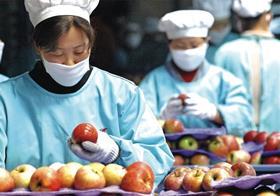
China's Fuji apple export deal is facing an exceptionally challenging start this season amid weak demand from world markets and unfavourable exchange rates, according to leading suppliers.
While adverse weather affected last season's crop, production is reportedly stronger this year. A recent USDA report pegged the overall Chinese apple crop for 2008/09 at some 28.5m tonnes, up 15 per cent on the 24.8m-tonne revised estimate for 2007/08. The increase has been attributed to 'a high year in the production cycle' and favourable weather conditions in major production areas such as Shaanxi and Shandong.
Despite the predictions, leading marketers told Fruitnet.com that sales to both domestic and export markets are very sluggish this year, bringing pressure to bear on prices.
'The Chinese apple market is very bad,' Jack Gao of Goodfarmer told Fruitnet.com. 'There is no big demand in the domestic market and export volumes are much lower than before, so we are treading carefully.'
Unfavourable exchange rates and weak demand are combining to bad effect, according to Raymond Jin of Golden Wing Mau. 'The quality and size of the crop are good, but the weakness of the euro against our currency as well as the general lack of market demand are hitting sales,' he said. 'The FOB price for Europe is currently €8-9 per 20kg carton for smaller sizes; for larger sizes the market is just too weak.'
Chinese growers received high prices for their fruit last year as many traders and consolidators paid inflated rates for apples, encouraged by reduced production and the prospect of strong demand before and during the Beijing Olympics. The highly anticipated consumption boom failed to eventuate, and many dealers were left with large stocks on their hands and heavy losses.
The farm-gate prices have come down this year, but seemingly not enough to spur demand. 'Last year Chinese growers received record-high prices, and we expected purchasing prices to be much lower this year, but they're not as low as we expected,' said Mr Jin.
Growers have continued to see the cost of key inputs such as fertiliser, pesticides and labour climb, according to the USDA. Meanwhile, the strengthening of the Chinese currency - the yuan - has pushed up the cost of Chinese apples for overseas buyers.
'Last year the Chinese yuan was around Yn7.2-7.5 to the US dollar whereas now it is Yn6.8,' said Richard Leung of Alfa Fruit Packers. 'When you combine this with the appreciation of the US dollar against other currencies in Asia, it makes our fruit more expensive. For instance, in India, we may be quoting a landed price of US$12-12.50 per 10kg carton this season, compared with US$14 per carton last year, but it feels like the same price for the Indian buyer due to the exchange rate.'
With Washington Red Delicious being quoted at lower FOB prices for India and other Asian markets going into the new season, the difficulties have only been compounded for China. 'US apples set the benchmark and if their prices are lower, it makes it hard for high-quality Chinese Fuji to earn a good price,' noted Mr Leung.
Pricing of Chinese apples depends to a great extent on the domestic market, and sluggish demand locally is beginning to force prices down, Mr Leung observed. 'Prices have already dropped by 50 cents per kg over the last two weeks,' he said.
Seeking an explanation for the weak export demand that has been facing the new season Chinese Fuji crop, some companies have predictably pointed to the economic crisis.
The USDA has forecast that total Chinese apple exports will fall by 15 per cent to 870,000 tonnes in 2008/09, citing reduced demand due to the worldwide economic slowdown. In Russia, the leading market for Chinese apples, some buyers have cancelled contracts signed earlier this year. Many buyers, including those from South East Asia, have also become more cautious about placing orders, and are buying small volumes on weekly or monthly basis.
Alfa Fruit Packers' Mr Leung, however, argued that other factors, such as adverse exchange rates, increased competition and oversupply, are to blame for the poor market. 'The economy does not have much to do with it,' he said. 'Some of the big trading companies are pouring fruit into markets with no regard for quality. Demand in the Middle East is very slow and this is largely because the market is very congested with a glut of poor quality fruit. They still had old-season Fujis selling there last month.'
He also believes the melamine scandal on infant formula may have tarnished the image of Chinese food exports and made buyers in certain markets more cautious about importing Chinese apples.
One point of consensus between suppliers is that this year's Fuji crop is trending towards smaller sizes. 'Volumes appear to be similar to last year, but the fruit size is definitely smaller this year,' said Mr Leung.
Mr Gao said the predominant fruit size is count 100 and smaller whereas last year it was count 80 and smaller.